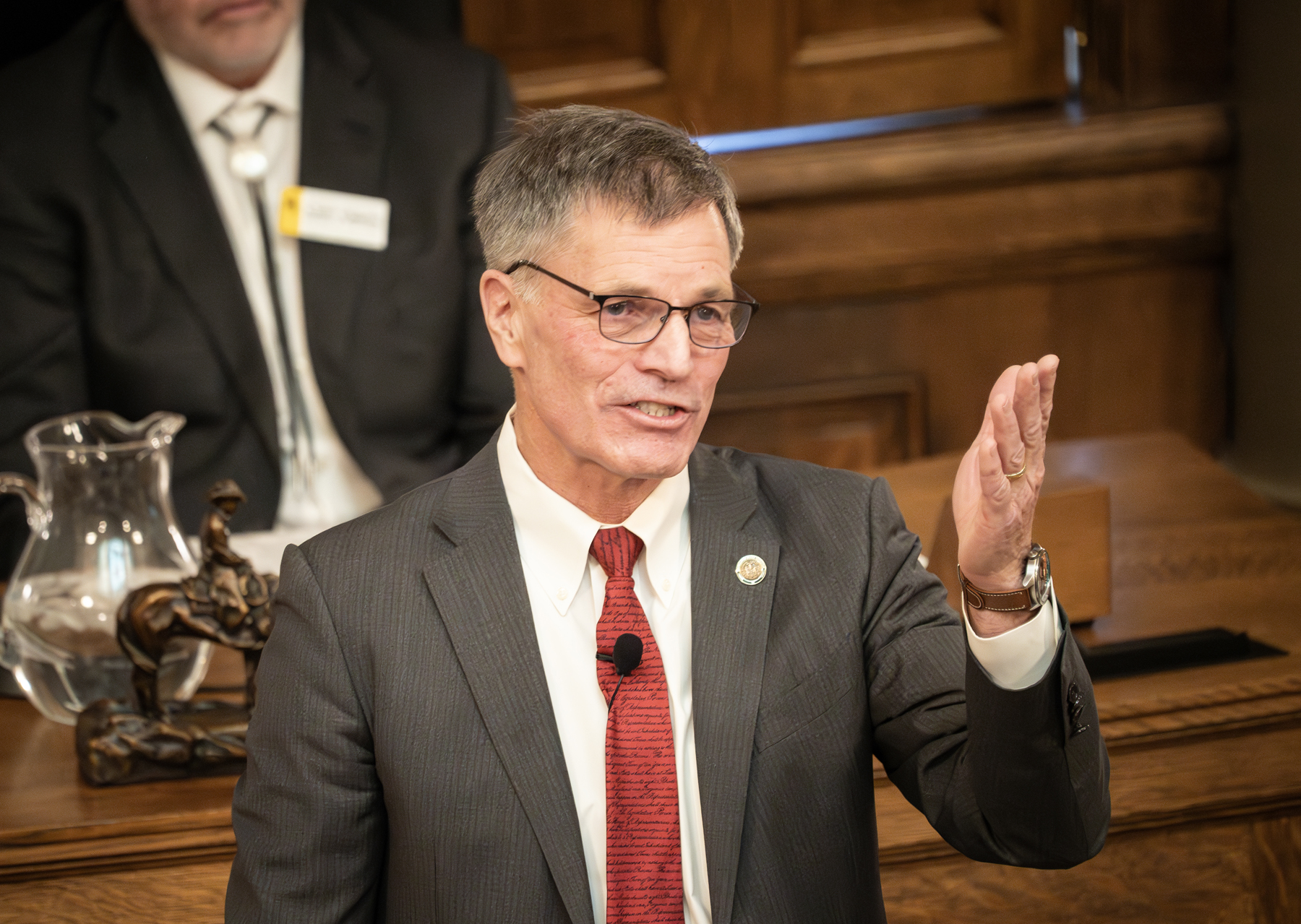Lawmakers criticize governor for veto of property tax bill

Gov. Mark Gordon, photo by Michael Smith
CHEYENNE — Wyoming legislative leaders and other lawmakers criticized Gov. Mark Gordon on Friday for his veto of a bill that would have provided property tax relief for all Wyoming homeowners.
Out of nearly two dozen property tax bills considered over the 2025-26 biennium budget session, only five made it to the governor’s desk. Four of the five bills were signed into law by Gordon on Thursday — Senate File 54, “Homeowner tax exemption,” was the one bill he vetoed.
Over the next two years, SF 54 would have provided a 25% tax reduction for all Wyoming homeowners up to the first $2 million of assessed value for a residential property, based on the fair market value of the home. The bill included a backfill for loss in tax revenue to local school districts, cities, counties and special districts.
The fiscal impact of this backfill on the state was estimated to be at least $220 million, if not more.
“The Bidenomic-type of ‘tax relief ’ in this bill is what I would expect from Washington, D.C. liberals, not conservative Wyoming legislators,” Gordon said in a veto letter accompanying a late Thursday news release. “It is a temporary relief measure that could lead to budget shortfalls, and will ultimately be paid for by raising taxes on our children.”
Rep. Steve Harshman, R-Casper, told the Wyoming Tribune Eagle on Friday he was disappointed that the bill failed to become law.
When he first read the governor’s news release Thursday night, Harshman said he was “irked” by the governor’s choice of words.
“We put a lot of time into that bill,” Harshman said. “Unfortunately, I think in politics we kind of take swipes at each other like that.”
Since the Cowboy State had a recent surplus in revenue from its mineral industry, Harshman, who chairs the House Revenue Committee, hoped the state would provide a little more relief to Wyomingites. It wasn’t permanent relief, he said, just an opportunity to give Wyomingites a break for a couple of years.
“It wasn’t gonna be a long term deal,” Harshman said. “It was disappointing, because I think folks would have really welcomed that.”
Rep. Clark Stith, R-Rock Springs, said in a news release that Wyoming property taxes have skyrocketed, with double- digit increases felt across many communities due to surging property values. Legislators listened to hours of testimony and received hundreds of emails about the issue, he said.
“This committee bill was the result of hard work and compromise, with overwhelming support in both chambers. To have it vetoed blindsided us,” Stith said in the release.
Laramie County Assessor Todd Ernst told the WTE this bill would have helped every homeowner in Laramie County and across the state of Wyoming. He wasn’t in favor or against the bill, but SF 54 was the only one Ernst said would provide relief across the board.
Senate President Ogden Driskill, R-Devils Tower, and House Speaker Albert Sommers, R-Pinedale, broke their silence on the governor’s recent vetoes, including SF 54, in a joint news release on Friday afternoon.
The legislative leaders said they’ve become “increasingly concerned about the Governor’s disregard for the will of the people’s representatives and the legislation we have passed.” This concern was only further heightened by his latest veto, according to the release.
“We are extremely disappointed that Governor Gordon would characterize this relief from skyrocketing property taxes as a giveaway to Wyoming citizens,” they said in the release. “Despite the Governor trying to characterize this bill as liberal spending, he forgets that cutting taxes is a conservative value. Time-limited tax relief is both conservative and prudent.”
However, Republican Cheyenne lawmakers Rep. Dan Zwonitzer and Sen. Stephan Pappas said they weren’t quite as surprised to see Gordon nix SF 54. Zwonitzer told the WTE it was difficult to calculate the fiscal impact the bill would have on the state, with so many amendments added in the final two weeks of the session.
“There were too many ideas and too short of a time with too many numbers,” Zwonitzer said. “We tried to quantify it, we thought it would be about a quarter of a billion. But there were some people saying we could be wildly off.”
Pappas said in an email to the WTE he originally opposed the bill while it was worked on in committee. He supported it in the end, however, after lawmakers added a backfill to support the loss of local tax revenue and added a sunset date — but even then, the senator said he was still reluctant.
Although the bill would have provided relief to homeowners, Pappas said it didn’t provide relief to Wyoming’s industries, “which are paying the bulk of the taxes.”
“Wyoming’s tax structure is truly lopsided,” Pappas said. “We need to find a more balanced system so the tax burden is more equitable amongst all taxpayers.”
This story was published on March 23, 2024.







